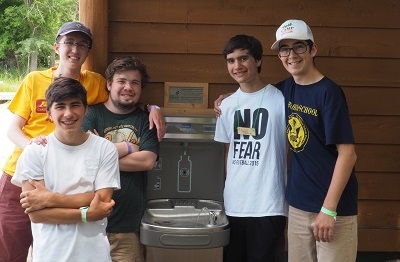Growing Up Strong
Finding Strength, Hope and Friendship at Camp Knutson

“To describe what Camp means to me is practically an impossible task, but I also thought it would be impossible to be comfortable with who I am given my heart disease,” Anders writes in his letter to Camp K staff after his final summer attending camp. “I came to realize that my heart is not something that holds me back or defines me. I will always be plagued by health concerns, but letting those concerns stop me from enjoying life is pointless. The memories I have made at Camp are some of my most cherished memories.”
The sun shines on a small patch of Minnesota paradise where five young men sit around a table, joking and jostling one another. Their eyes are alternately sparkling and reflective. They speak of their shared history, the summers they have been meeting at camp. At the early ages of 6 and 7, they first met through Camp Odayin, a national partner with Camp Knutson designed especially for children and youth with heart conditions. As they grew, day camp turned into overnight camp at Camp Knutson. It is an impressive list of years, starting in elementary school and progressing through high school.
And yet, they admit that they don’t talk much about a key factor in how they ended up here together: between them they have sustained twenty-five surgeries for heart conditions. The weight of what they have had to cope with in their lives comes through as a deep and abiding sense of gratitude.
That they don’t speak of their surgeries here is a testament to Camp Knutson and the carefully cultivated culture of inclusion, belonging, respect, dignity. They don’t talk about their surgeries because at Camp K, it is understood that they have all sustained these traumas. Because in the world outside Camp, talking about it means they will be treated differently. But here they are an integral part of a community of campers who know what it is to grow up with a heart condition. And because it is a common understanding, these young men have the grand opportunity to let their guard down.
“Camp Knutson teaches you how much good there is in the world,” says Will. “Over time, you realize these people really do understand. Heart patients can easily connect with one another here.”
Robert chimes in, “Having friends at camp is different than regular friends because they actually understand what having a heart condition is like. Regular friends find out and they ask, ‘oh no do you need a heart transplant?’ And they don’t fully understand.”
They all agree they share a camaraderie with one another that is unique and that having a heart condition can be a blessing in disguise.
Says Marcus, “People ask me, ‘is it awful having heart disease?’ and I always respond ‘no,’ it’s a blessing. I have met amazing people through this. Camp has been a huge part of that and I probably wouldn’t have the same attitude if it weren’t for camp. I wouldn’t have done all the fun activities we’ve been able to do together. I wouldn’t have learned about what I can do even though I have heart disease. It’s awesome.”
Adds Robert, “I have a different sense of my own capabilities because of my experience at camp.”
Carter explains, “Camp is super fun. I get to hang out with people who have heart problems like I do. You get to know each other and understand where they come from. You can have a lot more fun because you aren’t scared to do anything.”
These young men are poised, well-spoken, and joy-filled, ready to conquer the world, full of heart and spirit. Their resiliency is palpable. 2016 was their last summer as campers as they head into their senior years of high school and first year of college. They talk about the “vacation from life” camp has given them – the respite from worry, and a place where they came to understand, “I can live with this [heart condition].” Here they learned to focus on what they can do, on learning to be comfortable with who they are, and to embrace the life they have.
As they leave this community as campers, they talk about the desire to give back, exploring the possibility of becoming counselors. They share how their names came to be etched above the newly- installed water fountain on the waterfront.
Marcus explains, “Nurses and counselors are always telling you to drink water because cardiac kids need to stay hydrated. Staff were always bringing jugs of water down to the waterfront. The fountain is our way to say thank you for all they have done for us and our families. It’s not about the destination, it’s about the journey. All these years, you are learning about yourself, about your friends, about your heart condition. It’s been a heck of a lot of fun.”
Will seems to sum up what they all are feeling when he says, “Camp has taught me how great the world can be. When you get so many people who have been through so much, it’s the most incredible experience – these will be the guys I remember from my childhood. Camp reminds you that everything is going to be alright.”
